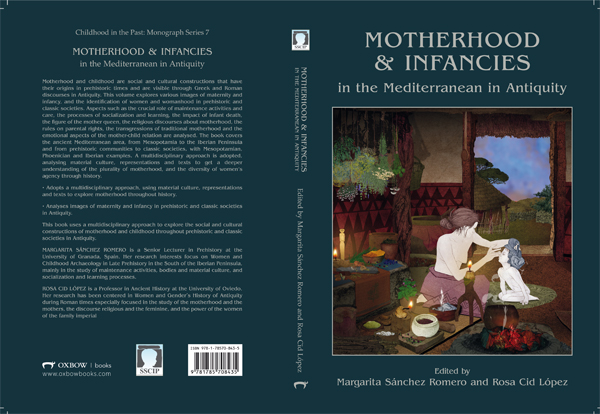Motherhood and Infancies in the Mediterranean in Antiquity
2018. Oxford, Oxbow

Resumen
Motherhood and childhood are social and cultural constructions that have their origins in prehistoric times and are visible through Greek and Roman discourses in Antiquity. In this volume we will explore the various images of maternity and infancy and the identification with women and womanhood in prehistoric and classic societies. Aspects such as the crucial role of maintenance activities and care, the processes of socialization and learning, the impact of the infant death, the figure of the mother queen, the religious discourses about motherhood, the rules on parental rights, the transgressions of traditional motherhood or the emotional aspects of the mother-child relation will be analyzed. The book will search in the ancient Mediterranean area, from Mesopotamia to the Iberian Peninsula and from prehistoric communities to classic societies with examples of Mesopotamian, Phoenician or Iberian societies. A transdisciplinary approach that will analyses material culture, representations and texts in order to go deeper into the gender analysis considering motherhood and its plurality, and the diversity of women´s agency through history.
Contenidos
1. Motherhood and infancies: archaeological and historical approaches Margarita Sánchez Romero and Rosa Mª Cid López
2. The child is dead: decision-making and emigration in Bronze Age Iberia Paloma González Marcén
3. Learning to be ...: learning and socialisation in ceramic productions during Bronze Age in peninsular southeast Spain Eva Alarcón García, Juan Jesús Padilla Fernández, Alejandra García García and Luis Arboledas Martínez
4. Beyond biology: the constructed nature of motherhood(s) in ancient Near Eastern sources and studies Agnès Garcia-Ventura
5. Death in birth: pregnancy, maternal death and funerary practices in the Phoenician and Punic world Ana Delgado Hervás and Aurora Rivera Hernández
6. Looking after dead infants: the materialisation of care in Sicilian child burials (10th–7th centuries BC) Meritxell Ferrer
7. Creating beings: relations between children and animals in the Iron Age Western Mediterranean Mireia López-Bertrán
8. Maternities in Iberian societies. From day-to-day life to sacredness Carmen Rueda Galán, Carmen Rísquez Cuenca and Ana B. Herránz Sánchez
9. Motherhood, gender and identity in the Athenian polis M. Dolors Molas Font
10. Childhood and motherhood in Ancient Greece: an iconographic look Susana Reboreda Morillo
11. The (ir)relevance of being a mother. A legal perspective on the relationship between mothers and children in ancient Greece Laura Pepe
12. The Queen and her children: Royal motherhood in Hellenistic Greece María Dolores Mirón Pérez
13. Mors immatura, childhood and maternal–filial relationships in the carmina epigraphica. Case studies from the Iberian Peninsula Rosa María Cid López
14. Mater civitatis: forms of patronage, charity and foundations for children Almudena Domínguez-Arranz
15. Mothers and sons in Plutarch’s Roman Parallel Lives. Auctoritas and maternal influence during the Roman Republic Borja Méndez Santiago
16. Seruae, mothers and the mother–child bond in Roman Italy. The analysis of the epigraphic evidence Carla Rubiera Cancelas
17. On the margins of motherhood: images of the puella docta and the lover-poet in the Latin love elegy Rosa Marina Sáez
18. Childhood and maintenance. Legal norms related to education and guardianship of minors, from Antoninus Pius to Justinian María Isabel Núñez Paz
19. The relationship of Iulia Mamaea and Alexander Severus. A review through literary sources Pedro David Conesa Navarro
20. Representations of women, motherhood and childhood in Spanish primary school textbooks Silvia Medina Quintana
21. Women and children omitted in the teaching of history: causes and consequences Antonia Garcia Luque
